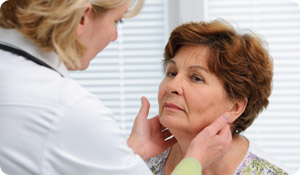
If you have diabetes, you may have a slightly increased risk for developing head and neck cancer, according to a recent study.
The study, from Tainan University of Technology in Taiwan, found that people with diabetes had a nearly 50 percent higher risk of head and neck cancers compared to people without the condition. The research, published in JAMA Otolaryngology, noted that the heightened risk was seen in people ages 40 to 65.
But the study was not conclusive, and there are many steps you can take to reduce your chances of being diagnosed with one of these cancers...
Head and Neck Cancers
About 55,000 cases of head and neck cancer are diagnosed annually in the United States, explains Michael Roberts, MD, a head and neck oncology specialist with Arizona Oncology, a practice in The US Oncology Network. Typically, head and neck cancers originate in the squamous cells—flat, scale-like cells that make up the outer layer of skin—lining the moist surfaces of the nasal cavity, lips, mouth, sinuses, salivary glands, tonsils, larynx, and throat.
Some 12,000 individuals in the U.S. die each year from these cancers, Roberts says. Treatment for head and neck may include surgery, radiation therapy, and/or chemotherapy. The prognosis varies depending on a variety of factors. "About 22 percent of people who get head and neck cancer will die from it," Roberts says. "A lot depends upon the location of the cancer, the type, and the stage of the cancer at the time of diagnosis."
What the Study Means
While the Taiwanese study, which found that individuals with diabetes had an incidence of head and neck cancer that was 1.47 (or 47%) higher than the incidence overall is informative, much more research is needed before a firm link between diabetes and head and neck cancer can be established, says Maged Ghaly, MD, radiation oncologist at North Shore-LIJ Cancer Institute in Lake Success, NY. "It’s still not really solid," he says. "The question is whether we can use the information in the study to do more research to see if there is a significant risk here for people who have diabetes."
Adds Roberts: "It would be nice to see what happens when they do the study on a different population and in a more controlled setting. There definitely needs to be more research and follow up."
Meanwhile, there are steps you can take to reduce your risk:
- If you smoke, quit, and if you drink alcohol, make sure to limit your intake. "The primary risk factors for head and neck cancer are tobacco, heavy alcohol use (as in more than three to four drinks per day), and the biggest risk is a combination of the two," says William Lydiatt, MD, coauthor of Cancers of the Mouth & Throat: A Patient’s Guide to Treatment (Addicus Books) and professor and division chief of the Department of Otolaryngology and Director of Head and Neck Surgery at the University of Nebraska Medical Center in Omaha.
- Beware of HPV. The human papilloma virus may increase the risk of head and neck cancer, Lydiatt says. "It’s not specifically addressed in the Taiwan study," he says. "But you can lower your risk of HPV by not having multiple sexual partners, unprotected sex, and oral sex." (There is an HPV vaccine; but, as Lydiatt notes, the vaccine "needs to be done prior to sexual activity so it is not recommended in adults. I recommend it for boys and girls.")
- Get regular dental checkups and make sure your exam includes a check for oral cancer.
- Monitor yourself for certain warning signs. "The biggest things to look for are a painless neck mass, a red or white spot in the mouth that doesn’t go away for two to three weeks, and persistent hoarseness," Lydiatt says. "Also watch out for ear pain on one side that does not go away for two or three weeks."
William Lydiatt, MD, reviewed this article.
Sources
"Diseases and Conditions: Head and Neck Cancers." Mayo Clinic. Posted June 27, 2013.





